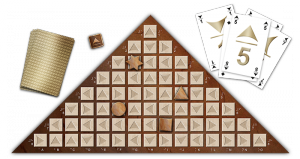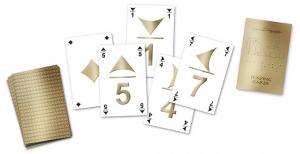Do You See What I Play? The Imhotep Labyrinth, A Visionary Game Not Just for the Blind
COPENHAGEN, DENMARK, June 4, 2015 /EINPresswire.com/ -- There’s sight, and then there’s vision. A person with sight has what the blind person lacks. A person who is blind must depend more upon the other working senses in order to function. The two worlds exist, or at least seem to exist, on dramatically different sensory levels, and there’s no common ground for the sighted and the sightless. But vision is a different matter, open to people on varying levels of perception. What people don’t see with their eyes, they perceive with their other senses. That’s particularly true for people who are sharing an experience together. Social experiences bridge the chasm between people who have a physical disability and those who don’t. The problem is that those kinds of experiences are unfortunately limited.
Awareness of those limitations inspired Johannes W. Schroder and Jan Jorgensen to find a way for blind and sighted players to have fun together on equal terms. Thanks to a new game and a Kickstarter crowdfunding campaign, the world of sight is about to meet the world of vision on a level playing field. That’s because Schroder and Jorgensen developed The Imhotep Labyrinth, a visionary game that’s not just for the blind. According to the World Blind Union (WBU), a global organization that strives to improve conditions for the blind, an estimated 285 million people are totally or partially blind. The WBU and its members and organizations in 190 countries are eager to remove the barriers between those who are blind and those who can see. Board games, which are played by people all over the world, are usually limited to people with sight. If they are available for the blind, it’s because they’ve been adapted from games originally developed for people who can see. But if a person with sight wants to play a board game with a blind person, what are the options?
Over the years, Schroder created a number of different board games. He was inspired with the idea for this game when he was employed by an organization that arranged transportation for handicapped patients. A young blind woman told him that the games he’d created didn’t challenge her. He realized that a person’s inability to see didn’t diminish their intellectual ability to play a game.
The Imhotep Labyrinth, an exciting innovation in the world of tabletop games, is a board game that consists of a playing field with depressions for 64 game stones, four game figures to stand on the game stones, a specially designed die, and 36 playing cards. Game rules are printed both in print and in Braille. There are three different versions with varying levels of difficulty; the game can be played by two-four players. The two simplest versions of the game take approximately 20-30 minutes to play. As players learn the game and become more adept, they’re ready for the highest level of the game, which takes approximately 45 minutes to an hour to play.
WBU President Arnt Holte says the game, which reminds him of a form of chess, makes him think more strategically than when he’s playing games involving dice or ladder games. As much as the strategy, Holt appreciates the social aspects of the game. “I think that a blind person and a sighted person can understand each other better if the circumstances under which they play . . . are similar.” A person who can see doesn’t have an advantage over a blind person in this game; they play at equal advantage. He believes that even children younger than six can learn to play The Imhotep Labyrinth. Holte believes that it’s a natural instinct for people to exercise their competitive instincts over games. Too often, he notes, blind people don’t have an opportunity to compete because other people, with good intentions, help the blind on a level that prevents the blind from helping themselves. This tends to stifle the competitive instinct which should be developed in everyone. Board games, which encourage social interaction, are an ideal way to compete.
Crowdfunding donations of $184,085 are needed by July 1 in order for the campaign to successfully launch this remarkable game. Do the “eyes” have it? Encourage competition on an entirely new level, and discover what you haven’t been seeing with your eyes.
About The Imhotep Labyrinth
Johannes W. Schroder and Jan Jorgensen, the developers of The Imhotep Labyrinth (www.theimhoteplabyrinth.com) are long-term business partners who enjoy helping people who aren’t in the media spotlight. Their game is developed for blind players but can also be enjoyed by people who either have some vision impairment or have 20-20 vision. The Imhotep Labyrinth, which is reminiscent of a form of chess, was developed for the blind while including players with sight. The World Blind Union applauds the game for its efforts to integrate the blind into everyday society.

Awareness of those limitations inspired Johannes W. Schroder and Jan Jorgensen to find a way for blind and sighted players to have fun together on equal terms. Thanks to a new game and a Kickstarter crowdfunding campaign, the world of sight is about to meet the world of vision on a level playing field. That’s because Schroder and Jorgensen developed The Imhotep Labyrinth, a visionary game that’s not just for the blind. According to the World Blind Union (WBU), a global organization that strives to improve conditions for the blind, an estimated 285 million people are totally or partially blind. The WBU and its members and organizations in 190 countries are eager to remove the barriers between those who are blind and those who can see. Board games, which are played by people all over the world, are usually limited to people with sight. If they are available for the blind, it’s because they’ve been adapted from games originally developed for people who can see. But if a person with sight wants to play a board game with a blind person, what are the options?
Over the years, Schroder created a number of different board games. He was inspired with the idea for this game when he was employed by an organization that arranged transportation for handicapped patients. A young blind woman told him that the games he’d created didn’t challenge her. He realized that a person’s inability to see didn’t diminish their intellectual ability to play a game.
The Imhotep Labyrinth, an exciting innovation in the world of tabletop games, is a board game that consists of a playing field with depressions for 64 game stones, four game figures to stand on the game stones, a specially designed die, and 36 playing cards. Game rules are printed both in print and in Braille. There are three different versions with varying levels of difficulty; the game can be played by two-four players. The two simplest versions of the game take approximately 20-30 minutes to play. As players learn the game and become more adept, they’re ready for the highest level of the game, which takes approximately 45 minutes to an hour to play.
WBU President Arnt Holte says the game, which reminds him of a form of chess, makes him think more strategically than when he’s playing games involving dice or ladder games. As much as the strategy, Holt appreciates the social aspects of the game. “I think that a blind person and a sighted person can understand each other better if the circumstances under which they play . . . are similar.” A person who can see doesn’t have an advantage over a blind person in this game; they play at equal advantage. He believes that even children younger than six can learn to play The Imhotep Labyrinth. Holte believes that it’s a natural instinct for people to exercise their competitive instincts over games. Too often, he notes, blind people don’t have an opportunity to compete because other people, with good intentions, help the blind on a level that prevents the blind from helping themselves. This tends to stifle the competitive instinct which should be developed in everyone. Board games, which encourage social interaction, are an ideal way to compete.
Crowdfunding donations of $184,085 are needed by July 1 in order for the campaign to successfully launch this remarkable game. Do the “eyes” have it? Encourage competition on an entirely new level, and discover what you haven’t been seeing with your eyes.
About The Imhotep Labyrinth
Johannes W. Schroder and Jan Jorgensen, the developers of The Imhotep Labyrinth (www.theimhoteplabyrinth.com) are long-term business partners who enjoy helping people who aren’t in the media spotlight. Their game is developed for blind players but can also be enjoyed by people who either have some vision impairment or have 20-20 vision. The Imhotep Labyrinth, which is reminiscent of a form of chess, was developed for the blind while including players with sight. The World Blind Union applauds the game for its efforts to integrate the blind into everyday society.
Johannes Schröder
The Imhotep Labyrinth
www.theimhoteplabyrinth.com
email us here
Legal Disclaimer:
EIN Presswire provides this news content "as is" without warranty of any kind. We do not accept any responsibility or liability for the accuracy, content, images, videos, licenses, completeness, legality, or reliability of the information contained in this article. If you have any complaints or copyright issues related to this article, kindly contact the author above.



